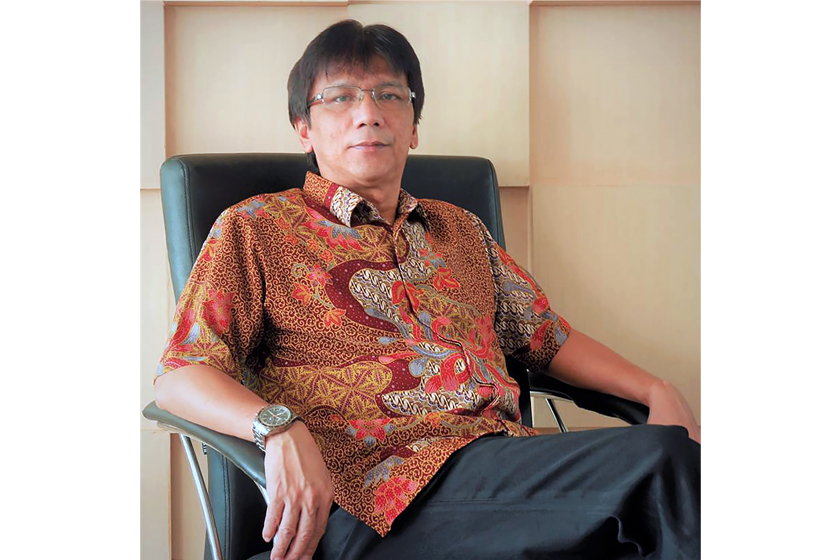At the onset of the COVID-19 pandemic, Afrial Rosya, Director of Early Warning at the National Disaster Management Authority (Badan Nasional Penanggulangan Bencana, or BNPB), was part of the team that helped coordinate the Indonesian Government's initial response—ensuring it acted quickly with what little information existed about the new virus.
When Afrial first heard about COVID-19 at the end of February 2020, he was at the Royal Australian Air Force Base at Richmond near Sydney. He had been assigned earlier that month to support the Indonesian National Armed Forces team as they assisted Australian authorities in putting out bushfires in the state of New South Wales.
"I knew Australia had reported some early cases of COVID-19, and I thought that we should also take precautionary steps when we returned to Indonesia," recalled Afrial, who is an alumnus of the Australia Awards Humanitarian Action Short Term Awards hosted by the University of Queensland in February 2019 and funded by the Australian Government.
Indonesia reported its first case of COVID-19 on 2 March 2020, shortly after Afrial arrived back in Jakarta. On 13 April 2020, the Indonesian Government designated the COVID-19 pandemic as a national disaster by Presidential Decree Number 12 of 2020 concerning Determination of Non-Natural Disasters for the Spread of COVID-19.
The national disaster status allowed the National Disaster Management Authority to coordinate the main tasks and functions of ministries/institutions and regional governments in response to the pandemic.
The COVID-19 Accelerated Response Task Force was led by the Head of the National Disaster Management Authority. As Acting Head of the COVID-19 Accelerated Response Task Force Secretariat, Afrial assisted the Head of the Task Force in coordinating a broad range of stakeholders using the pentahelix concept. This multi-stakeholder model involves coordination of government, academia, business, the community and the media.
The Task Force also coordinated support from other governments, such as that provided through the Australian-Indonesian Partnership in Disaster Risk Management, or SIAP SIAGA (“ready” in Indonesian). SIAP SIAGA is a five-year partnership between the Governments of Australia and Indonesia to strengthen Indonesia’s disaster risk management, and is funded by Australia’s Department of Foreign Affairs and Trade.
"It is the largest implementation of multi-party coordination in the history of disaster management in Indonesia," said Afrial.
“We needed to coordinate to find answers to problems. There are no days off during an emergency response.”
One of the first issues the Task Force tackled was the provision of testing kits and personal protective equipment for health workers and doctors, as the shortage had already cost lives. “The philosophy of the National Disaster Management Authority is that in an emergency response, public safety is the highest law that must be enforced,” said Afrial.
The Task Force acted quickly, negotiating with businesses so that a percentage of personal protective equipment slated for export could be set aside for domestic use. To facilitate import of rapid test kits and personal protective equipment, the National Disaster Management Authority waived the import duties.
To ensure proper information dissemination, Afrial and the Deputy of Prevention collaborated with the Disaster Information and Communication Data Center at the National Disaster Management Authority to prepare press conferences, official statements and public education, which they broadcasted through the television pool at the office. Afrial also oversaw volunteers working with the Task Force.
One of the Task Force’s major achievements was the establishment of a national COVID-19 center referral hospital. Afrial is very proud of how the National Disaster Management Authority collaborated with the Ministry of Health and the Indonesian National Armed Forces to convert the former 2018 Asian Games athlete’s village into a specialised hospital that can accommodate more than 7,000 patients in a relatively short time.
"We managed the budget while the National Armed Forces provided the medical teams, and the Ministry of Health focused on strengthening the overwhelmed health facilities," Afrial elaborated.
In July 2020, the Indonesian Government established the COVID-19 Response and National Economy Recovery Committee to mitigate both the health and economic impacts of the pandemic. The COVID-19 Accelerated Response Task Force was dissolved, and the COVID-19 Response Task Unit was established in its place together with the National Economy Recovery Task Unit, both overseen by the Committee.
The work of Afrial and the rest of the Task Force team laid a solid foundation for the Committee to carry out its responsibilities.
When Afrial returned to his main duties as Director of Early Warning, he saw that the public’s lack of adherence to health protocols during natural disasters—such as the earthquake in West Sulawesi and flood in South Kalimantan—was causing an increase in COVID-19 cases.
“People forget about the importance of wearing masks, maintaining distance and washing hands during disaster emergencies. We need to stay vigilant as natural disasters still occur, even during a pandemic,” Afrial said. In 2020 alone, Indonesia faced major floods, volcanic eruptions, landslides, and earthquakes.
Afrial and his team worked closely with relevant stakeholders to prepare guidelines on how to respond to earthquakes and tsunamis during the pandemic. With funds from USAID, they produced a pocketbook on COVID-19 health protocols for the community and local governments.
Together with the Disaster Information and Communication Data Center they also provided public education through the state television channel by inviting speakers including government officials, the private sector, universities, media and non-government organisations, with private television stations rebroadcasting some of the segments.
Afrial admits it is not easy to ensure that people adopt health protocols in the event of a natural disaster.
"My hope is that good and consistent public communication can change people's mindsets and behaviour. We need continuous education, socialisation and mitigation efforts with the community and local government to ensure they comply with health protocols,” Afrial said.
“Even though we have vaccines now, it is imperative to implement health protocols for as long as the pandemic is still ongoing. Only then can we truly prevent the spread of the pandemic."


 Coordinating Indonesia's Early Response to the COVID-19 Pandemic
Coordinating Indonesia's Early Response to the COVID-19 Pandemic
